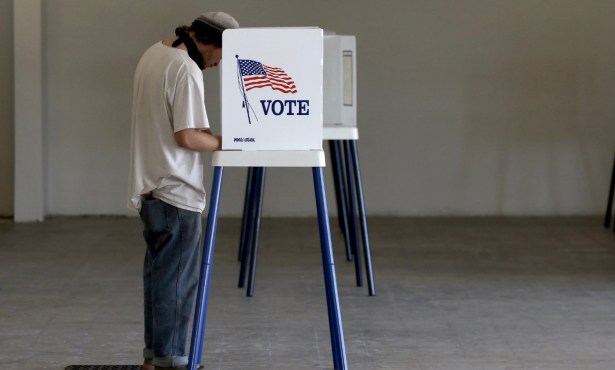Dogs Before Dishonor
CHARGE IT:
CHARGE IT: The good news coming out of Afghanistan these days is that the country is loaded with mineral wealth. Just days before Congress was set to vote on a quasi-contentious $80-billion spending bill to fund our escalating war there, the Pentagon released a study showing that Afghanistan boasted about a trillion bucks’ worth of sub-soil mineral assets. The moral of the story, I guess, is that there’s money to be made, and not just off opium production. Among the key assets identified by the Pentagon to be plundered and pillaged was lithium. In fact, according to news accounts, Afghanistan could well be the “Saudi Arabia” of lithium. That’s good news for a couple reasons. First, lithium — a clay-born alkaline and the world’s softest metal — is necessary for the production of cell phone, iPod, and laptop computer batteries — without which we would certainly cease to function. And since some nano-engineered variant of lithium-ion batteries will be powering the next wave of environmentally cuddly cars, lithium has already emerged as the green equivalent of oil. Just two years ago, in fact, business publications were bemoaning the arrival of “peak lithium” — just as we wishful thinkers among the eco-apocoleptics were proclaiming the imminent onset of peak oil. But that, of course, was before BP proved us so vividly wrong, demonstrating just how much oil there really is. There are, of course, intense psychic costs associated with our increasingly autistic lifestyle, not to mention the more obvious trauma suffered by those dispatched to the front lines to kill or be killed. For many, lithium-based salts have provided the basis for exceptionally potent psychoactive drugs, effective in treating those with acute depression and bipolar disorders. Clearly, the national security of United States now depends upon a safe supply of lithium. Given that one-half the world’s known lithium reserves reside within the borders of Bolivia, a nation run by Evo Morales — a coca-leaf-chomping, skirt-chasing, soccer-playing socialist with a really bad haircut — I, for one, can’t sleep at night. Thank God for Afghanistan.

But the problem with this report, like all information coming out of Afghanistan, is that it comes from Afghanistan. Tales of Afghanistan’s mineral resources may be old news — based on superficial estimates released several years ago by the United States Geological Survey — strategically recycled just as public support for the war is waning. Questions of reliable information, however, are nothing new. For years, the generals in charge have repeatedly assured us that the Afghani military and police are making great strides toward self-sufficiency. Soon they will be able to run their own country without American and NATO troops getting blown up at a rate of about 100 a month, about the same number of actual Al Qaeda terrorists still left in Afghanistan. But late last month, the U.S. Inspector General for Afghanistan Reconstruction issued a 50-page report concluding that we have no real clue how ready they are. To the extent we know anything, the news is not encouraging. After the Unites States spent eight years and $27 billion trying to cultivate and prop up an Afghani military that’s trained, reliable, and not preying upon its own people, the Inspector General found only 23 percent of the Afghani military — and only 12 percent of the police force — can operate dependably without direct NATO supervision. As of this March, no less than 12 percent of the Afghani army had simply walked off the job, reportedly upset at poor pay. Many parts of the country were too dangerous for American military readiness assessors to even go. And some Afghani troops given high marks in the past all but evaporated when confronted with the first whiff of the Taliban. This story, however, lacked the poignant emotional immediacy of basketball star LeBron James’s free-agency dilemma or Lindsay Lohan’s weeping courtroom antics, and has gained little traction.
Neither did the report released two weeks ago by the London School of Economics concluding that the Pakistani equivalent of the CIA was all but directing two of the three main Taliban factions in Afghanistan that are now killing Americans at an accelerating clip. In fact, this study reported that Pakistani intelligence agents were sheltering Taliban fighters in safe houses while supplying them with special plastic explosives that are much harder to detect. Naturally, the Pakistanis have been using funds provided by the United States to buy the very supplies they’ve given the Taliban to send our sons and daughters home in pine boxes. Given that Obama argues that we’re in Afghanistan, in part, to keep the Afghan Taliban from crossing the border into Pakistan, there’s no shortage of grim irony here. Except, of course, that high-ranking U.S. and Pakistani officials have assured us that the report is nothing but “pure rubbish.” They pointed out that the author of the report was actually a professor from Harvard, and not really with the London School of Economics. (No, I’m not making this up.)
But other governmental sources have privately suggested that Pakistani rulers are worried the United States might pull out of Afghanistan, leaving them to deal with the Taliban alone. In this context — according to this school of spin — last week’s congressional vote on a resolution that would condition increased funding for escalating the war in Afghanistan to the president’s initial pledge to begin troop withdrawal next April, doesn’t make the Pakistanis sleep easy at night. (Santa Barbara Congressmember Lois Capps, by the way, voted for this resolution. So did 209 of her colleagues. That’s 20 percent more than voted for a similar measure a year earlier. Even so, it still lost — though just barely. As consolation prize, it appears Democrats managed to exact $10 billion in politically correct pork to put thousands of recently laid-off public school teachers back to work.) Given that Pakistan has The Bomb, that nation’s sleep disorders should be of grave concern to all of us. With this in mind, it’s only natural that Pakistani intelligence officials would make overtures to Taliban factions. And what better way to show how much you care than plastic bombs?
If this convoluted deviousness passes for serious political argument in favor of a protracted military occupation, I will definitely need pharmaceutical help falling asleep. And much to stay awake. In the meantime, thank God for lithium. And thank God for Afghanistan, too.



